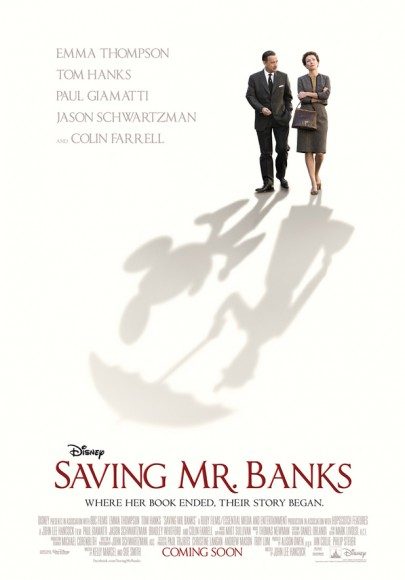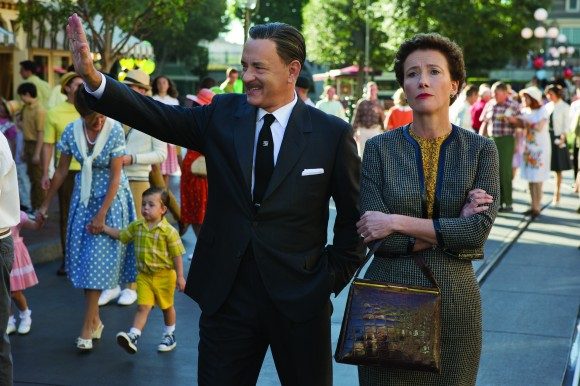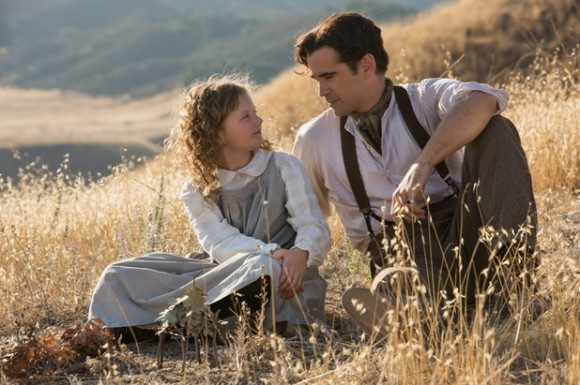I admit it: I never particularly enjoyed Mary Poppins when I was a kid. I don’t know why, and I haven’t seen it in years, so maybe my opinion would be different now, but the six year old me was not a fan. But I am pleased to report that my opinion of the movie-about-the-movie is much higher, hampered in no way by my ambivalence towards, or general unfamiliarity with, Mary Poppins itself. Saving Mr. Banks is a crowd pleaser in the best sense of the term (this comes, after all, from the director of The Blind Side and The Rookie), a movie that will delight audiences of all sorts, and one that’s got plenty of substance for those demanding more than mere fan service.
At the core of this is Emma Thompson’s portrayal of P.L. Travers in all her scalding beauty and horror. Saving Mr. Banks is a film that dives into sentimentalism at several points, but largely due to both the severity of Travers character and the quality of Thompson’s portrayal, the movie doesn’t feel manipulative. Travers’s gradual softening feels earned largely because Thompson plays her as so unflinchingly resilient to all attempts by Tom Hanks’s Walt Disney and his creative team (played by Bradley Whitford, B.J. Novak, and Jason Schwartzman) to draw her out. If you’ve seen Thomspon’s excellent work in Stranger Than Fiction, imagine her no less neurotic but attempting to cover it up with considerably more bravado (and a fair bit of genuine snobbiness) and you just about have Thompson’s Travers. She is, understandably, the emotional and narrative center of this film, and she’s excellent.
The aforementioned supporting cast, plus Paul Giamatti as her slightly dense but endlessly well meaning driver, all work well. Giamatti is a great fit in his supporting role, and Novak and Schwartzman are surprisingly convincing as the brothers in charge of Mary Poppins‘ music and lyrics. Hanks, of course, gets the meatiest role as Walt Disney and is very good. It’s not a performance that’s going to generate a lot of awards consideration, nor should it, necessarily, but there’s thankfully no trace of hamminess here; Hanks is acting, and he feels spot on as Disney.
More important, however, are the performances by Annie Rose Buckley and Colin Farrell as the young P.L. Travers (nicknamed Ginty) and her father. One of the major narrative features of the movie is a series of flashbacks which continuously alternate with the “current” story taking place in 1961. The flashbacks do wonders to aid our the adult Travers. We begin to understand why she is so severe and how the world of Mary Poppins is arranged in her mind. The parallel is very directly drawn between these flashbacks and the current events, but like the rest of the film, it’s so well presented and adds so much to the story that I didn’t mind the connection being a little over-obvious. This is the first feature role for Buckley and she shines as a child upon whom adulthood is thrust. Farrell, meanwhile, plays a character channelling Johnny Depp’s James Barrie from Finding Neverland, but the similarities shouldn’t be counted as a strike agains Farrell or this movie. Whereas Depp’s character drew depth from his external challenges, Farrell’s character finds depth through sizable internal demons revealed to the audience in parallel with Ginty’s discovery that her father is not perfect. Just as Depp received an Oscar nomination for his performance a Barrie, Farrell ought to be considered in the supporting category for his work here.
If there’s a knock against the film, it is that it loses much of the earnestness that characterizes it through the first two thirds. This is almost expected; with Travers’s gradual relenting must come some break in tension. But to its credit, Saving Mr. Banks got me so invested in the story that I didn’t really care; like a good book that takes its time tying up all the loose ends, the movie earned its time on screen and made me want to see the story to the end.
The Verdict: 5 out of 5
The simple truth is that Saving Mr. Banks is a delight to watch. It’s a movie which is undoubtedly aimed at the mass audiences, but is also plenty sharp thanks to a good script by Kelly Marcel and Sue Smith, strong directing by John Lee Hancock, and a great cast headlined by an spectacular performance by Emma Thompson. It walks that line between expectation and pleasant surprise with near perfection, especially due to some tremendously fun interplay between the present story and flashbacks to P.L. Travers’ up-and-down childhood. There are moments where the plot lags a bit, or where the story goes just a bit to0 melodramatic, but these issues quickly fade in the face of the quality presented by the rest of the film. This movie is a ton of fun for Poppins aficionados and initiates alike.




